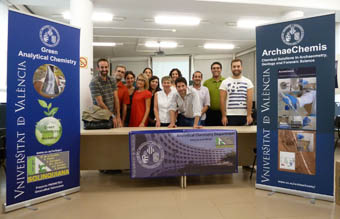
ARCHAECHEMIS has been designed as a unit for research and technology transfer aimed both at the general public and at research groups and organisations engaged in the assessment of our past and our heritage. It collaborates with key sectors in the Valencian industry as are ceramics, paints, foodstuffs or crop products.
Among the services offered some stand out for their half-historical, half-detective interest, as is the case of the most sophisticated and innovative chemical techniques that are applied to solve puzzles from the recent and the distant past, such as whether certain historical figures died of poisoning or not, whether the walls in Sagunt are still the same that Hannibal saw in the Second Punic War or whether the stone quarries used by prehistoric peoples to build their tools can be identified.
The research group SOLINQUIANA, attached to the Department of Analytical Chemistry of the University of Valencia and comprising professors Miguel de la Guardia, Agustín Pastor, Salvador Garrigues, M. Luisa Cervera, Angel Morales and Dr Sergio Armenta, is working on several lines of research and has participated in several competitive projects with the common goal of developing sustainable analytic tools for determining species of environmental, agronomic, clinical, pharmaceutical and nutritional interest. It is currently working with various companies in the phytosanitary, paints and coatings, ceramics, food, chemical and environmental sectors and provides technical advice and consultancy services for the analysis of metals in biological media, in food and in samples of environmental interest. Also, it conducts studies on environmental pollution by metals and non-metals. Additionally, it produces and controls new parapharmaceutical and phytosanitary products and performs authentication and assessment processes on foodstuffs with a protected designation of origin through the use of analytical techniques. The results of its research activity have been published in numerous articles in scientific journals as Analytical Chemistry, Journal of Chromatography TrAC, Food Chemistry and Food Science, among others.
This previous experience in analysing skeletal remains, ceramics, soils, mummified tissue, stones and textiles led to the creation of ARCHAECHEMIS, headed by Gianni Gallello, PhD from the University of Valencia specialised in the chemical analysis of archaeological remains, in palaeodiet and in physical anthropology. The team, composed of teaching and technical staff from the Department of Analytical Chemistry and supervised by Agustín Pastor, professor of Analytical Chemistry at the University of Valencia, provides the historical, archaeological, chemical and environmental knowledge needed to offer an integrated view of heritage items and of archaeological and forensic remains.
Archaeometry is the branch of archaeology that applies physical and chemical methods to extract all possible information from an archaeological piece. In recent decades significant progress has been made in archaeometric methodologies, which have opened the way to new lines of research, and also, have contributed to support the traditional methodological applications of archaeology. This has allowed access to a data record which would otherwise be unattainable without resorting to these new analytical techniques.
The ARCHAECHEMIS service is intended to answer questions such as: Were some great historical figures, like Pico della Mirandola, poisoned with arsenic or with mercury? Are the castle walls in Sagunt still the same that Hannibal saw during the Second Punic War? Can cremated bones be useful for reconstructing people’s lifestyles? It is possible to identify the stone quarries from which the stone objects used by prehistoric peoples originated? Can we tell if a piece of land was used as farmland at some stage? And this is possible, says Gianni Gallello, "because the services that ARCHAECHEMIS will offer comprise qualitative and quantitative research techniques based on chemistry, using appropriate instruments and making an accurate processing of data and interpretation of results". The team of six researchers and four technicians applies several techniques ranging from analysis of trace elements —those that are non-essential that can be found in metals and minerals in very small amounts—, chromatographic analysis and molecular spectrometry to microscopy and genomics.
"This proposal has already contributed several academic publications, including scientific articles and dissertations, and even if our central aim is to serve the Valencian society, we are already taking part in different activities together with Italian and English research groups", said Agustín Pastor.
The group’s website, www.uv.es/archaechemis, offers more detailed information about the service and technical means available, as well as the contact details.
Last update: 15 de december de 2014 15:14.
News release



















